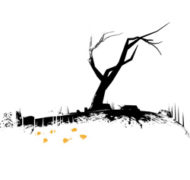The Unfinished Swan: Video Games and God’s Story of Me
Video / Produced by The High Calling
I’m no painter, but even I find a blank canvas tempting.
A blank canvas invites creation ex nihilo, a start from scratch, a tabula rasa upon which we can splatter paint or quickly sketch a still-life. But if a blank tableau promises a fresh start unencumbered by the past, it deceives us...for we never really start anything without a history. Who I am today is a direct result of not only my choices about college, career, family, and faith, but also of the decisions my parents and grandparents made. The stories of how they emigrated from the Netherlands to Canada, how they married and worked, and their commitment to their church—my church—are an intimate part of the tapestry of my faith and character.
Likewise, all art builds on past stories and past lives, which is the reality tackled in a short, but creative and magical indie game titled The Unfinished Swan, released in 2012 by Giant Sparrow on the Playstation Network.
The Unfinished Swan is, in a nutshell, a game about revealing that which is already present.
To begin, I found the gameplay very simple: Wander a magical kingdom with only the ability to shoot balls of paint. At first, the three-dimensional space of the game world is purely white, so I quickly discovered I needed to spatter stuff with globs of black in order to figure out where I was and where I should go. This, coincidentally, makes The Unfinished Swan playfully therapeutic. While the world eventually regains some color and there are different ways to use the paint (or water, depending on the scenario), the whole game basically boils down to a series of puzzles solved by revelation.

And that is exactly what the game’s story is about. Through short and simple cutscenes, I learned the tale of the game’s protagonist, the newly-orphaned boy, Monroe, who followed the honking and bright yellow footprints of a swan from his mother’s unfinished painting through a magic door into a de-populated fantasy kingdom. Embarking on a journey of revelation, I discovered that the paint not only made the landscape visible, but when splashed on golden letters, the paint also uncovered, bit-by-bit, a fairy tale about a king so obsessed with his artistic visions that he continually clashed with his subjects and neglected his loved ones.

Just as the stories of my parents illuminate the kind of person I am today, Monroe’s work of revelation becomes the work of re-discovery: finding a hidden world, learning about his past and where he fits in this world. The story isn’t epic, but it is poignant and sweet. And while there is nothing explicitly religious about The Unfinished Swan, it is a relatively light-hearted and thoughtful consideration of loss and redemption. I found echoes of the great story at the heart of the Gospel: reconciliation in spite of imperfection, not to mention a creative playfulness that exercises our God-given love of art and puzzling.

The Unfinished Swan is no big-budget-Call of Duty-style extravaganza. Its graphics are simple, although possessing a kind of beauty, and its overall sound feels weak—effects being a bit amateurish at times and the narrator failing to wow me—though the music is generally appropriate for the moods the game tries to invoke. On the plus side, The Unfinished Swan is not a kill-fest. Except for one segment where the player can be attacked by spiders that some children (like mine) might find frightening, most of it is completely non-violent.
A significant difference between The Unfinished Swan and a big-budget game is the shortness: a proficient gamer could complete this indie title in less than two hours. Even novices won’t take more than a dozen sessions to reach the end. But the creativity of the gameplay, the game’s story, and its atmosphere all make up for any shortcomings.
Like Monroe, my past—even the past I can’t remember—shapes my present. The Unfinished Swan is a gentle reminder that revealing my stories helps me re-discover the kind of person God has made me.




